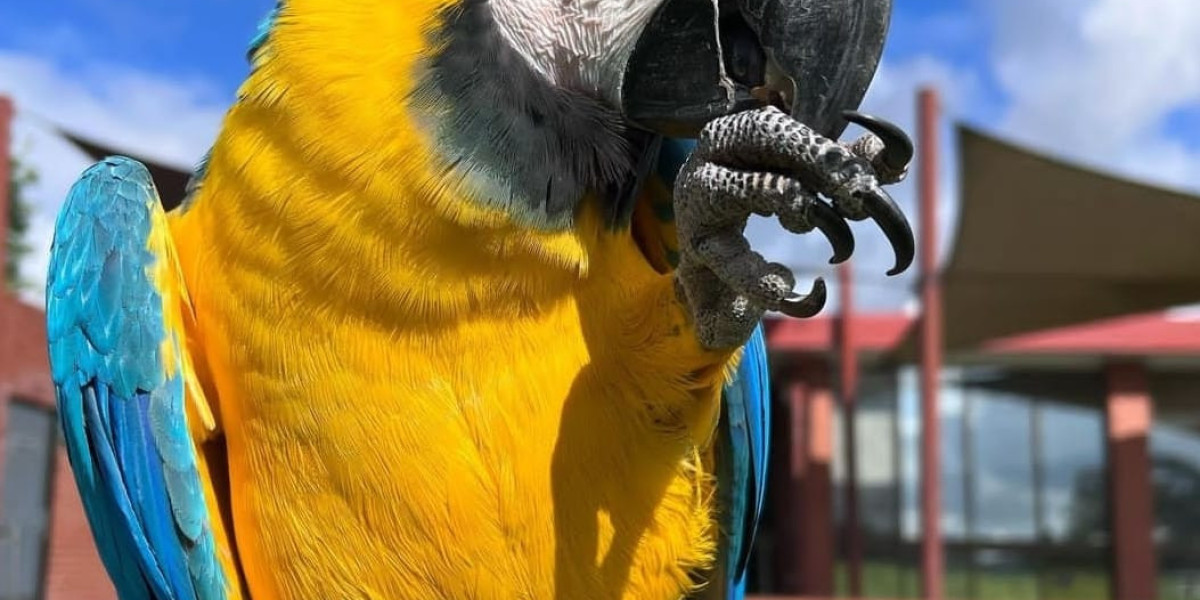Macaws, with their vibrant plumage and impressive intelligence, are among the most captivating and sought-after parrots in the world. These majestic birds are not just beautiful; they also require a significant amount of care, attention, and a lifelong commitment. If you're considering bringing a macaw into your home, it's crucial to choose a reputable and ethical source. Here’s a comprehensive guide on where to buy a macaw and what to consider before making this important decision.
1. Research and Preparation
Before you start looking for a macaw, it’s essential to do your homework. Macaws can live for 50 to 60 years or more, so this is a lifelong commitment. Here are some key points to consider:

- Space Requirements: Macaws need large, secure enclosures that provide ample room to move, spread their wings, and exercise.
- Diet: They require a balanced diet that includes a variety of fruits, vegetables, nuts, and seeds, as well as specialized bird pellets.
- Social Interaction: Macaws are highly social and need regular interaction with their human family to thrive. They can become bored and depressed without enough attention.
- Financial Commitment: Owning a macaw can be expensive, with costs including the bird itself, a large cage, toys, food, and regular veterinary check-ups.
- Legal Considerations: Ensure that it is legal to own a macaw in your area. Some species are protected, and you may need a permit.
2. Reputable Breeders
One of the best places to buy a macaw is from a reputable breeder. A good breeder will prioritize the health and well-being of their birds, ensuring they are raised in a clean and safe environment. Here’s how to find a reputable breeder:
- Research: Look for breeders who are members of recognized avian organizations, such as the American Federation of Aviculture (AFA) or the World Parrot Trust.
- Visit: If possible, visit the breeder’s facility to see how the birds are kept. The environment should be clean, and the birds should appear healthy and well-cared for.
- Questions: Ask about the bird’s lineage, health history, and any certifications. A responsible breeder will be happy to provide this information.
- Support: Good breeders often offer ongoing support and resources for new owners, which can be invaluable during the early stages of ownership.
3. Avian Rescue and Adoption Centers
Another ethical option is to adopt a macaw from a rescue or adoption center. Many macaws are surrendered due to the challenges of their care, and these centers work to find them new, loving homes. Adopting a macaw can be a rewarding experience, as you’ll be giving a bird a second chance at a happy life.
- Research: Find local avian rescue organizations or contact national groups like the Parrot Rescue and Rehabilitation Center.
- Visit: Spend time with the birds to see which one you feel a connection with. Rescue staff can provide valuable insights into each bird’s personality and needs.
- Questions: Inquire about the bird’s background, any health issues, and the level of socialization. This information will help you understand what to expect when bringing the bird home.
- Support: Many rescue centers offer post-adoption support, including training and behavior advice.
4. Pet Stores and Avian Specialists
Some pet stores specialize in exotic birds and may have macaws available for sale. However, it’s crucial to choose a store that is known for its ethical practices and high standards of care.
- Research: Look for stores that are well-reviewed and have a good reputation. Avoid stores that keep birds in small, cramped cages.
- Visit: Go to the store and observe the conditions in which the birds are kept. The environment should be clean, and the birds should be healthy and active.
- Questions: Ask about the bird’s origin, health, and care. A knowledgeable store staff will be able to provide detailed information and advice.
- Support: Check if the store offers any support services, such as grooming, training, or health consultations.
5. Online Reputable Dealers
If you live in a remote area or cannot find a suitable breeder or rescue center nearby, online dealers can be a viable option. However, buying a macaw online requires extra caution.
- Research: Look for dealers with positive reviews and a track record of ethical practices. Verify their credentials and licenses.
- Visit: If possible, arrange a visit to the breeder’s location to see the birds in person. If this isn’t feasible, request detailed photos and videos.
- Questions: Inquire about the bird’s health, socialization, and any health guarantees. Ensure that the dealer is transparent and responsive.
- Transport: Make sure the dealer has a safe and reliable method for transporting the bird to you. If possible, pick the bird up in person to ensure it arrives safely.
6. Ethical Considerations
When buying a macaw, it’s important to consider the ethical implications. Here are some points to keep in mind:
- Captive-Bred Birds: Always opt for captive-bred macaws. Wild-caught birds are often stressed and may carry diseases. Plus, the trade in wild-caught birds can contribute to the decline of their populations.
- Support Legitimate Sources: Choose sources that are legally and ethically sound. Avoid any breeder or seller that cannot provide proper documentation or seems suspicious.
- Avoid Impulse Buys: Take your time to make an informed decision. Impulse buys can lead to unhappy birds and overburdened owners.
7. Final Steps
Once you’ve found a macaw, there are a few final steps to ensure a smooth transition:
- Health Check: Take the bird to an avian veterinarian for a thorough health check before bringing it home.
- Set Up the Cage: Prepare a large, comfortable cage with plenty of toys and perches. Ensure the cage is in a quiet, safe part of your home.
- Gradual Introduction: Introduce the bird to its new home gradually to help it adjust. Spend time talking to and interacting with the bird to build a bond.
- Learn About Macaws: Educate yourself about macaw behavior, diet, and care. Join online forums or local bird clubs to connect with experienced owners.
Bringing a macaw into your home is a significant and rewarding commitment. By choosing a reputable breeder, rescue center, or ethical pet store, you can ensure that your new feathered friend is healthy, well-socialized, and given the best possible start in life. Remember, a macaw is not just a pet but a lifelong companion. Take the time to prepare and make an informed decision, and you’ll enjoy a beautiful and enriching relationship with your macaw for many years to come.









